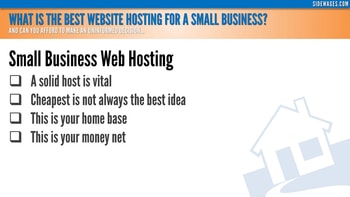Choosing a web hosting service that can provide the right speed, support, and security for your site is never that easy. You might need to do some research or wide consultations before deciding on which company to go for.
If you choose to work with a reliable and high-performing hosting company, then you can be assured of getting the right support any time you need it.
But if you settle for a poor-quality host, chances are you’ll experience limited online presence, less traffic, reduced earnings and ultimately more frustrations.
Just to help you get started on the right path, I’ve crafted a step-by-step guide on how to choose the right web hosting company, which I am sure will go a long way.
#1. Which Type of Hosting You Need
Understanding your site needs is the first step towards finding the right web hosting company to work with.
The type of web hosting configuration you choose will basically depend on the size and traffic of your website.
of web hosting configuration you choose will basically depend on the size and traffic of your website.
For instance, you don’t need a dedicated server if you’re running a personal blog or small business website neither should you choose the cheapest plan for a premium e-commerce website that experiences high traffic.
So what’s the best way to go?
Well, here are my recommendations:
A. Choose Shared Hosting For Small to Medium Websites Shared hosting is a type of web hosting where several websites run on or share the same server.
Being simple and straightforward, it makes for an ideal choice for customers hosting small to medium sized sites for the first time. However, since you are sharing a server with hundreds, if not thousands of other websites, the speed and performance your site might be jeopardized.
When considering the type of shared hosting option to choose, you should look at such aspects as support, storage, performance, and price. There’s some value you can get from using this form of hosting. But as your website grows, you need to consider upgrading to a VPS or dedicated hosting plan.
B.VPS Hosting Can Be Great For Fast-Growing Websites VPS (Virtual Private Server) is a type of server that’s divided into several large portions or independent dedicated servers that only serve a few customers or websites.
This type of hosting tends to offer customers greater control of their web hosting experience compared to shared hosting plans. And with the ability to add or remove a few extra computing resources, VPS provides even more flexibility and improved performance.
With the best VPS hosts in the market, you can expect to enjoy storage that comes with high-speed SSDs (Solid State Drives), regular software updates, patches among other managed services. Other top VPS hosting providers offer additional features like free monitoring, security, CDN services, cPanel license and/or full root access.
C. Go for Dedicated Hosting If You Are Looking For Maximum Server Resources and Security
A dedicated server hosting is the perfect choice to go for if you’re running a high-volume or high-performance website. With this type of hosting, an entire server is dedicated to powering a single website or all of its applications. The term dedicated’ simply means the server has the power to meet every configuration need of the target website.
With a dedicated server, a site owner can customize such aspects as the operating systems, security systems, and load balancers among other things.
Though it’s the most expensive among the hosting plans, it does offer top-level hardware, excellently managed services, and 24/7 support. In this plan, you can also enjoy a range of luxury features like dedicated IP addresses, choice of operating systems and automatic migrations and backups.
#2.Determine the Kind of Site You Are Creating
The process of finding the right host for your site doesn’t just stop with determining the server load or expected  traffic.
traffic.
It includes understanding the type of website you have or are building and figuring out which features can be relevant to it.
The needs of a blog or personal website might not be the same as those of an e-commerce website or online portfolio.
A. Blog: A WordPress Host Can Be Great
WordPress is one of the most popular content management systems among website builders today. Currently, it’s powering more than a quarter of all websites existing on the internet. While choosing the right host though, don’t just go for the streamlined one-click WordPress installation feature.
You might need to look for advanced features like upgraded hardware, unlimited storage & bandwidth, and pre-installed programs. A dedicated WordPress expertise and round-the-clock support are also other things you need to consider.
B. Online Store: E-Commerce Hosting Is the Best
With the tremendous growth of online shopping, especially in the US, more businesses are now building online stores to keep up with consumer needs and demands. And if you’re one of those businesses, you need to consider getting a web host that offers superior e-commerce options.
One of the most important features to consider in an e-Commerce host service is added security requirements for customer and payment information protection. You also need to find a service that offers attractive design templates, includes shopping cart software and integrates PayPal, E-mail marketing tools, and other services.
C. Online Portfolio or Resume: Consider Using a Website Builder
If you are creating a website for job supplicants and seekers to post their resumes or increase their online presence, then a web builder program can be the most ideal to use.
Some of the top web hosting companies like InMotion directly offer a unique website builder while others such as Weebly partner with web builder programs that provide drag-and-drop options for creating websites.
Other independent web builder programs that offer customized web building experience include Squarespace and Wix.
D. Personal Site: Think About a Low-Cost, High-Value Host
Whether you’re creating a website to tell your own story, document your escapades or connect with friends and share memories, you need to make your platform as appealing as possible. And the good thing is that there are web hosts that can help you achieve that using minimal financial and time resources.
If you would want to enjoy better value for your personal site, be sure to choose a host that offers unlimited storage and bandwidth, email accounts integration, online marketing credits and 24-hour support.
E. Business Site: Consider a Host That Can Help You Grow
A business website provides a great platform for advancing brand recognition and growing your business. And since a successful business website can experience a 10 to 20 percent growth each month, you might need to find a host that will provide you with a reliable, lifelong service.
That not only eliminates the stress of finding a new host but also reduces the hassle of having to transfer files and domains every now and then. A host service like HostGator provides elaborate plans from shared hosting through to dedicated hosting, something that allows a business site owner to grow seamlessly.
#3.Determine the Type and Amount of Resources You Need
While it’s good to consider a hosting service with most features and reasonable package prices, finding a hosting plan that’s compatible with your specific needs can even be better. The needs of a blog, e-commerce website, and the business site might all have different priorities in terms of bandwidth, storage, security and e-mail functionality.
Here are the main resources to look for:
A. Storage and RAM
Personal and small business websites usually need a small amount of storage or disk space to run. But high-performance blogs and e-commerce websites, running on either VPS or dedicated server hosting, may need more storage.
For much faster and more reliable web hosting storage, you need to consider using SSDs (Solid State Drives). When it comes to choosing a RAM for web hosting, it’s equally important to look at the processing speed of stored data as well as page load times.
B. Bandwidth and Data Transfer
The amount of bandwidth the web host offers affects the amount of data that can be downloaded from and uploaded to a website. Bandwidth also referred to data transfers, determines the speed at which visitors can access site information. Higher bandwidth typically means more people can view your site at the same time and at higher processing speeds.
C. Domains and E-Mails
A domain name, which denotes your website’s address, is something that can be registered (for management and reservation purposes) by a company other than the one hosting your site files.
But considering a company that provides both domain registration and web hosting can be convenient as you’ll have all the hosting resources in one account and may enjoy seamless free transfers and migrations.
For a business website that’s thriving, finding a strong domain and e-mail hosting service is important. For even better results, it can be great to find a host that offers advanced features like autoresponders, enhanced security and forwarding and filtering services.
D. Uptime Rates and Reliability
Uptime simply means the time which the web hosting service is working. A number of top hosting providers guarantee 100 percent uptime, where there are completely no outages, while others offer 99.9 percent to as low as 99 percent.
30 to 60 seconds of inaccessibility, on a typical e-commerce website, may cost the owner big time in terms of lost sales, diminished productivity and damaged reputation.
Hence finding a host with higher uptime rates and reliability is a must for a high-performance, high-traffic website.
E. Security and Support
Though a website’s security is largely determined by password strength and administrator’s behavior, the hosting provider’s architecture does play a critical role.
A host service that includes monitoring services, firewalls, and other relevant add-ons is likely to be less vulnerable to security attacks. A hosting service that offers automatic backups and WordPress updates can also go a long way in enhancing site security.
A company providing 24/7 support can be great as you’ll be able to get quick solutions to technical and security issues ailing your site and/or any queries regarding billing, updates, package pricing and more.
#4Understanding How Web Hosting Pricing Works
Price is a major aspect when it comes to choosing a hosting plan for your newly built or existing website. Even as you strive to stay within budget, you should never do that at the expense of support and performance. Web hosting is usually billed monthly, but you need factor in other costs relating to domain registration, plug-ins, site themes and more.
A. Why Free Hosting Is Not Always the Best
While FREE web hosting offers some level of convenience and attractive cost-saving strategy, the perks that come with paid hosting can’t be ignored. From premium features to advanced security all through to round-the-clock support, paying a few extra coins for an upgrade is always worth it.
Most free plans are often restricted sites to certain sub-domains. But once a site owner upgrades to either economical or premium plan, the domain, email and e-commerce restrictions are all scrapped off. So it’s better to upgrade to a paid plan if you really want to grow your site.
B. Why Cheap Hosting Providers May Offer
More Value than Expensive Ones Shared plans are often deemed to be cheaper and less valuable compares to VPS and dedicated hosting as they serve thousands of customers.
But upon careful consideration, you’ll discover that most affordable plans offer luxury features like automatic backups, website builder, content delivery networks and e-commerce tools. That allows website owners to experiment with different value-added services even as they grow and plan to upgrade.
C. Virtual and Dedicated Servers Are More Cost-Effective Than You Think
As you upgrade your plan and add more computing resources to your hosting service, the price tag goes up, that’s a no-brainer.
But because hosting providers usually bill customers based on the amount of resources used, you are not bound to paying a specific amount every month.
The VPS architecture is designed to scale up and down based on the amount of traffic coming to the website. Hence that explains the fluctuation in monthly bills.
Choose a Host That Can Help You Grow
As a beginner, you can always start with shared hosting to experience how the world of web hosting works and how it affects your performance. Once your website has grown in performance and traffic, you can consider going the VPS or dedicated server way.
For more flexibility and convenience in growth, you might need to consider a host that you can stick with right from shared hosting as you move up to dedicated server hosting. A hosting provider like HostGator offers more flexible software options and powerful hardware to get you started.
Its VPS plan unlimited free cPanel migration, something allows you to move your current hosting to where you want quite seamlessly.
My Final Words
Getting the right hosting company is as easy as following the steps I’ve enumerated above. It’s important to find a service that offers maximum resources, is compatible with your type of site and comes at a decent price.
You should never grow weary of finding a host that meets this threshold. And if you can find a host that can walk with you from shared hosting to dedicated server hosting as you grow the better. It’s all about the value you’ll get in the long run.
What about you? Are you pleased with your hosting company? Feel free to share your experience in the comments below.

Hi, Daniella. Thanks for sharing all this detailed information on web hosting. I am actually helping a friend set up their business website and we had some questions about the best hosting options for her. It is a small business website, so not a lot of traffic, but she wants to build out some content with a blog and get traffic that way, too. Would you recommend she start with shared hosting anyway? Is there a specific web hosting service that you would recommend for a site like this? We’d love your input. Thanks!
Hi Sunny,
Thank you for passing by!
If it’s a new new website, you definitely should chose a shared hosting company, they are cheaper and they offer great services. There are many good companies out there such as Hosgastor, Namecheap, BlueHost, DrimHost, SiteGround, Wealthy Affiliate, Wix and many others.
I hope it help! Feel free to contact me with any question. I’ll be more than happy to assist!
Thanks for an easy to follow and understand article.
It also seems more personal as I can see the author:)
Reliable hosting can definitely add more value and free our mind from stress. I had to cancel my original hosting serving from go daddy simple due to the hassle of detail tech know how and bombardment for pricing upgrades.
Hi Ash,
You are very welcome!
Yes, that’s the problem with some hosting companies, not all of them are cheap and some provide less support than other. Well, I hope you found the right hosting platform:)
Thank you for the comment and wish you a great day!